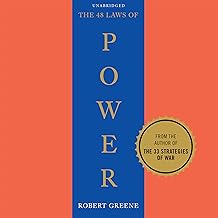
How to Read Robert Greene's Books on Power
How to Read Robert Greene's Books on Power
Estimated Reading Time: 10-12 minutes
Introduction
Robert Greene is a contemporary author whose works delve deeply into the intricacies of power, strategy, and human behavior. Born in 1966 in Los Angeles, Greene's eclectic background—encompassing a mix of classical studies, history, and various jobs in the creative industry—has shaped his unique perspective on power dynamics. His most notable work, "The 48 Laws of Power," has garnered both acclaim and controversy, making it a staple in discussions about influence and manipulation in personal and professional realms.
Greene's exploration of power is not merely theoretical; it is steeped in historical anecdotes and psychological insights that make his arguments compelling and relatable. In a world where power plays a crucial role in interpersonal relationships, understanding Greene's insights can be invaluable. His work serves as a guide, revealing the often unspoken rules that govern human interactions and the pursuit of influence.
Why Robert Greene's Perspective Matters
What sets Robert Greene apart from other thinkers on power is his unapologetic realism. Greene does not shy away from the darker aspects of human nature; instead, he embraces them, offering a pragmatic approach to understanding power dynamics. While many authors advocate for ethical leadership and moral integrity, Greene provides a candid look at the strategies used by historical figures to achieve and maintain power. This unvarnished perspective is particularly relevant in today's complex social and political landscape, where the pursuit of power can often overshadow ethical considerations.
Greene's insights are not just theoretical; they are rooted in historical precedent, drawing lessons from figures such as Machiavelli, Sun Tzu, and even contemporary leaders. His work challenges readers to confront uncomfortable truths about ambition, manipulation, and the nature of authority. This approach has made "The 48 Laws of Power" a perennial bestseller and a source of fascination for those seeking to navigate the often treacherous waters of influence and control.
Overview of Recommended Books
The 48 Laws of Power
"The 48 Laws of Power," published in 1998, is Greene's magnum opus, distilling centuries of historical examples into a practical guide for anyone looking to understand or wield power effectively. The book is structured around 48 distinct laws, each accompanied by historical anecdotes, philosophical reflections, and practical applications.
Main Themes and Arguments
At its core, the book explores the nature of power and how it can be acquired, maintained, and lost. Greene posits that power is a game, one that requires strategy, cunning, and an understanding of human psychology. The laws range from the seemingly innocuous—such as "Conceal Your Intentions"—to the more ruthless, like "Crush Your Enemy Totally." Each law serves as both a warning and a guide, illustrating the complex interplay of ambition, manipulation, and survival.
Historical Context and Significance
Greene draws on a rich tapestry of historical figures, from Cleopatra to Bismarck, to illustrate his points. This historical context not only lends credibility to his arguments but also provides readers with a broader understanding of how power has been wielded throughout time. The book's significance lies in its ability to distill these lessons into digestible laws that can be applied in modern contexts, making it relevant for anyone from corporate leaders to everyday individuals.
Key Insights and Takeaways
- Pragmatism Over Idealism: Greene emphasizes that power is not inherently good or evil; it is a tool that can be used for various ends. Understanding this allows readers to navigate their environments more effectively.
- The Importance of Strategy: Each law is a strategic maneuver that can be employed in different scenarios, highlighting the need for adaptability in the pursuit of power.
- Human Nature: Greene’s work underscores the importance of understanding human psychology. Recognizing the motivations and fears of others can provide a significant advantage in any power struggle.
Why Read This Book:
"The 48 Laws of Power" is essential reading for anyone interested in the mechanics of influence. It offers a unique contribution to the theme of power by blending historical analysis with practical advice, making it a valuable resource for professionals, students, and anyone seeking personal growth.
Key Themes and Sections
Greene's exploration of power is multifaceted, with several key themes emerging throughout the book:
- Manipulation and Deception: Many of the laws focus on the necessity of cunning and deception in the pursuit of power. Greene argues that to succeed, one must often operate in the shadows, concealing true intentions.
- The Role of Fear and Respect: Greene discusses the delicate balance between fear and respect in leadership. He posits that while fear can be a powerful motivator, respect is ultimately more sustainable.
- Adaptability: The laws emphasize the importance of being adaptable and responsive to changing circumstances. Greene advocates for a flexible approach to strategy, allowing for adjustments based on the actions of others.
Each section builds upon the previous one, creating a comprehensive understanding of power that is both practical and philosophical. The progression of ideas throughout the book encourages readers to reflect on their own relationships and ambitions, making it a transformative read.
Who Would Benefit from Reading These Books
"The 48 Laws of Power" appeals to a diverse audience, including:
- Students and Academics: Those studying psychology, political science, or sociology will find Greene's insights invaluable for understanding human behavior and societal dynamics.
- General Readers Interested in Power: Anyone curious about the mechanics of influence and authority will benefit from Greene's candid exploration of power dynamics.
- Professionals Seeking Practical Wisdom: Business leaders, entrepreneurs, and anyone navigating competitive environments can apply Greene's laws to enhance their strategic thinking.
- Anyone Looking for Personal Growth and Self-Improvement: Greene's work encourages self-reflection and personal development, making it relevant for those on a journey of self-discovery.
Recommended Reading Order
To maximize the insights gained from "The 48 Laws of Power," consider the following reading strategy:
- Begin with: The Introduction and First Law - Understanding Greene's foundational ideas sets the stage for the rest of the book.
- Focus on: Laws 1-10 - These initial laws establish the core principles of power and strategy, providing a solid grounding for the more complex laws that follow.
- Advanced study: Laws 11-48 - As you progress, engage with the historical examples and philosophical implications, allowing for deeper analysis and reflection.
To get the most out of this foundational work, take notes on how each law resonates with your own experiences and consider practical applications in your life.
Conclusion
Robert Greene's contributions to the understanding of power are both profound and provocative. "The 48 Laws of Power" serves as a crucial resource for anyone seeking to navigate the complexities of influence and authority. By exploring the darker aspects of human nature and offering practical strategies for success, Greene's work remains timelessly relevant.
As you delve into these ideas, remember to approach them with a critical mind, reflecting on the ethical implications of power dynamics in your own life. Whether you are a student, a professional, or simply a curious reader, Greene's insights can illuminate the often murky waters of human interaction. Embrace the challenge, and let the exploration of power enrich your understanding of the world around you.
Tags: #RobertGreene #Power #Philosophy #ReadingGuide #ClassicLiterature #Wisdom
Featured Books

The 48 Laws of Power
by Robert Greene
Published: 1998
Amoral, cunning, ruthless, and instructive, this multi-million-copy New York Times bestseller is the definitive manual for anyone interested in gaining, observing, or defending against ultimate control – from the author of The Laws of Human Nature. This is the only authorized paperback edition in the US. In the book that People magazine proclaimed “beguiling” and “fascinating,” Robert Greene and Joost Elffers have distilled three thousand years of the history of power into 48 essential laws by drawing from the philosophies of Machiavelli, Sun Tzu, and Carl Von Clausewitz and also from the lives of figures ranging from Henry Kissinger to P.T. Barnum. Some laws teach the need for prudence (“Law 1: Never Outshine the Master”), others teach the value of confidence (“Law 28: Enter Action with Boldness”), and many recommend absolute self-preservation (“Law 15: Crush Your Enemy Totally”). Every law, though, has one thing in common: an interest in total domination. In a bold and arresting two-color package, The 48 Laws of Power is ideal whether your aim is conquest, self-defense, or simply to understand the rules of the game. Read more